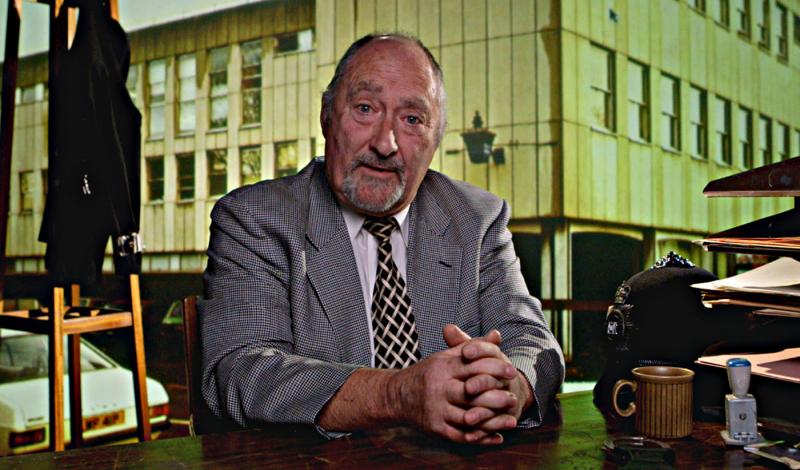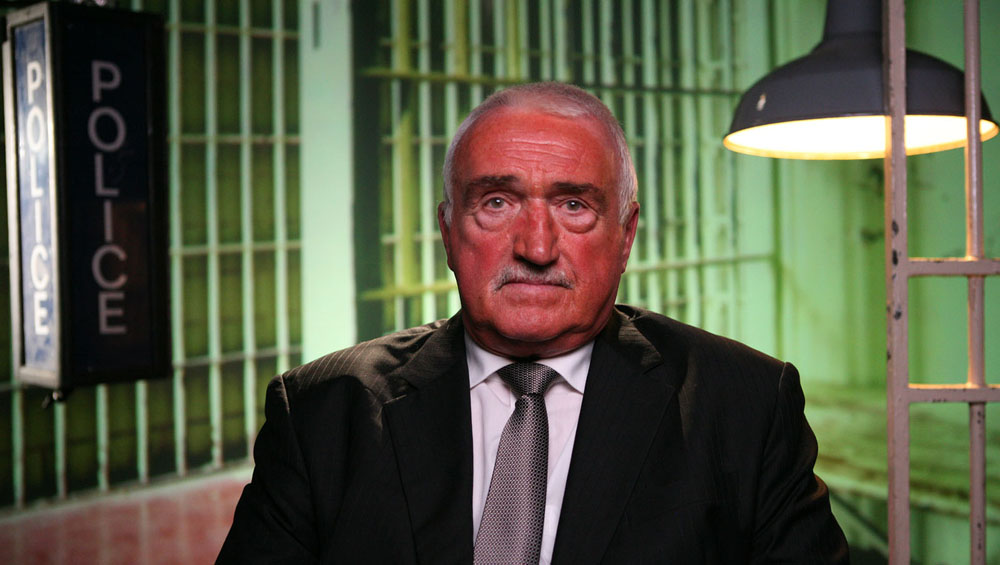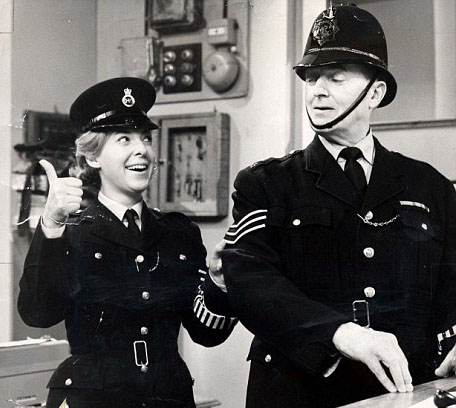Confessions of a Copper, Channel 4 | reviews, news & interviews
Confessions of a Copper, Channel 4
Confessions of a Copper, Channel 4
Ask a policeman?

This will have brought a nostalgic tear to the eye of fans of The Sweeney (the TV show, not the Ray Winstone movie) or GF Newman's still-shocking 1978 series Law and Order. The producers had rounded up seven retired policepersons and got them to spill some of the beans about what policing was like in the Sixties and Seventies.
The strange thing was, it was exactly like folklore says it used to be. There was plenty of rough justice including kickings and beatings, dousings in freezing cold baths and possibly even some electric shocks. Rule-bending was de rigueur, there was routine acceptance by officers of gifts and backhanders from a grateful public, and it was all washed down with buckets of booze. Sexism? Ask a silly question.
 I could just fill this review with some of the choice quotes. Stephen Hayes (above) described how forensic evidence, like hairs or clothing fibres, would be planted at crime scenes to manfacture a conviction. Any regrets? No. "You know they must be guilty, you know they're at something... if it meant bending a bit of the evidence you did it."
I could just fill this review with some of the choice quotes. Stephen Hayes (above) described how forensic evidence, like hairs or clothing fibres, would be planted at crime scenes to manfacture a conviction. Any regrets? No. "You know they must be guilty, you know they're at something... if it meant bending a bit of the evidence you did it."
Ken German, who retired from the force when it went all touchy-feely and multicultural, delightfully described how felons would be "taken into a corner and told their fortune." What did this mean, queried the interviewer? "That was a clip round your ear," explained Ken euphemistically. Was this legal? "Legality?" he expostulated. "What's that got to do with anything? You've got a job to do." Incidentally, Ken now has a doctorate in International Automobile Crime (pictured below, the golden age of British policing).
 In 1975, sex discrimination was officially banned in the police force, even if many male officers remained contemptuous of the idea that women would be any use in a street fight with a bunch of villains. However, relations between the sexes had been in dire need of improvement, women having been restricted to finding lost children and apprehending menopausal shoplifters. We were introduced to the "station stamp", an initiation ceremony in which new female recruits would have their skirts pulled up by the lads and the date rubber-stamped on their bottoms. "Upon reflection yes I suffered sexual discrimination, but I wouldn't have done any other job," claimed ex-policewoman Carole Phillips (pictured below).
In 1975, sex discrimination was officially banned in the police force, even if many male officers remained contemptuous of the idea that women would be any use in a street fight with a bunch of villains. However, relations between the sexes had been in dire need of improvement, women having been restricted to finding lost children and apprehending menopausal shoplifters. We were introduced to the "station stamp", an initiation ceremony in which new female recruits would have their skirts pulled up by the lads and the date rubber-stamped on their bottoms. "Upon reflection yes I suffered sexual discrimination, but I wouldn't have done any other job," claimed ex-policewoman Carole Phillips (pictured below).
 But coppers of either sex were united in their view that policing as they understood it had been demolished by a raft of overhauls and supposed improvements. There was a clip – among bags of pungently evocative archive material – of a certain Harriet Harman ("solicitor, Brent Law Centre") deploring the violent tactics of the Special Patrol Group, widely believed to have killed teacher Blair Peach at Southall in 1979 although no officers were ever charged. Suddenly the questionable culture of the police came under severe scrutiny, and 1984's Police And Criminal Evidence act introduced such innovations as tape-recording police interrogations. Previously, the cops could have a private chat with a prisoner in their cell and then go away and decide what had been said. The Stephen Lawrence murder and its appalling trail of corruption and lies prompted a new age of diversity training and a drive for multi-racial policing.
But coppers of either sex were united in their view that policing as they understood it had been demolished by a raft of overhauls and supposed improvements. There was a clip – among bags of pungently evocative archive material – of a certain Harriet Harman ("solicitor, Brent Law Centre") deploring the violent tactics of the Special Patrol Group, widely believed to have killed teacher Blair Peach at Southall in 1979 although no officers were ever charged. Suddenly the questionable culture of the police came under severe scrutiny, and 1984's Police And Criminal Evidence act introduced such innovations as tape-recording police interrogations. Previously, the cops could have a private chat with a prisoner in their cell and then go away and decide what had been said. The Stephen Lawrence murder and its appalling trail of corruption and lies prompted a new age of diversity training and a drive for multi-racial policing.
The old guard remained unconvinced. "I think we all have a view on political correctness, and it's bollocks," averred Ken German. Yet though the old ways were so crude and brutal, perhaps they were apt for a society with a fixed hierarchy and rigid notions of right and wrong. The police behaved like they did because there was an implicit consensus of support. Now, with police too buried under paperwork to do much actual policing (apart from arresting victims of crime) and eager to pretend that huge numbers of crimes never even happened, are we any better off?
The future of Arts Journalism
You can stop theartsdesk.com closing!
We urgently need financing to survive. Our fundraising drive has thus far raised £49,000 but we need to reach £100,000 or we will be forced to close. Please contribute here: https://gofund.me/c3f6033d
And if you can forward this information to anyone who might assist, we’d be grateful.

Subscribe to theartsdesk.com
Thank you for continuing to read our work on theartsdesk.com. For unlimited access to every article in its entirety, including our archive of more than 15,000 pieces, we're asking for £5 per month or £40 per year. We feel it's a very good deal, and hope you do too.
To take a subscription now simply click here.
And if you're looking for that extra gift for a friend or family member, why not treat them to a theartsdesk.com gift subscription?
more TV
 Mr Scorsese, Apple TV review - perfectly pitched documentary series with fascinating insights
Rebecca Miller musters a stellar roster of articulate talking heads for this thorough portrait
Mr Scorsese, Apple TV review - perfectly pitched documentary series with fascinating insights
Rebecca Miller musters a stellar roster of articulate talking heads for this thorough portrait
 Down Cemetery Road, Apple TV review - wit, grit and a twisty plot, plus Emma Thompson on top form
Mick Herron's female private investigator gets a stellar adaptation
Down Cemetery Road, Apple TV review - wit, grit and a twisty plot, plus Emma Thompson on top form
Mick Herron's female private investigator gets a stellar adaptation
 theartsdesk Q&A: director Stefano Sollima on the relevance of true crime story 'The Monster of Florence'
The director of hit TV series 'Gomorrah' examines another dark dimension of Italian culture
theartsdesk Q&A: director Stefano Sollima on the relevance of true crime story 'The Monster of Florence'
The director of hit TV series 'Gomorrah' examines another dark dimension of Italian culture
 The Monster of Florence, Netflix review - dramatisation of notorious Italian serial killer mystery
Director Stefano Sollima's four-parter makes gruelling viewing
The Monster of Florence, Netflix review - dramatisation of notorious Italian serial killer mystery
Director Stefano Sollima's four-parter makes gruelling viewing
 The Diplomat, Season 3, Netflix review - Ambassador Kate Wyler becomes America's Second Lady
Soapy transatlantic political drama keeps the Special Relationship alive
The Diplomat, Season 3, Netflix review - Ambassador Kate Wyler becomes America's Second Lady
Soapy transatlantic political drama keeps the Special Relationship alive
 The Perfect Neighbor, Netflix review - Florida found-footage documentary is a harrowing watch
Sundance winner chronicles a death that should have been prevented
The Perfect Neighbor, Netflix review - Florida found-footage documentary is a harrowing watch
Sundance winner chronicles a death that should have been prevented
 Murder Before Evensong, Acorn TV review - death comes to the picturesque village of Champton
The Rev Richard Coles's sleuthing cleric hits the screen
Murder Before Evensong, Acorn TV review - death comes to the picturesque village of Champton
The Rev Richard Coles's sleuthing cleric hits the screen
 Black Rabbit, Netflix review - grime and punishment in New York City
Jude Law and Jason Bateman tread the thin line between love and hate
Black Rabbit, Netflix review - grime and punishment in New York City
Jude Law and Jason Bateman tread the thin line between love and hate
 The Hack, ITV review - plodding anatomy of twin UK scandals
Jack Thorne's skill can't disguise the bagginess of his double-headed material
The Hack, ITV review - plodding anatomy of twin UK scandals
Jack Thorne's skill can't disguise the bagginess of his double-headed material
 Slow Horses, Series 5, Apple TV+ review - terror, trauma and impeccable comic timing
Jackson Lamb's band of MI5 misfits continues to fascinate and amuse
Slow Horses, Series 5, Apple TV+ review - terror, trauma and impeccable comic timing
Jackson Lamb's band of MI5 misfits continues to fascinate and amuse
 Coldwater, ITV1 review - horror and black comedy in the Highlands
Superb cast lights up David Ireland's cunning thriller
Coldwater, ITV1 review - horror and black comedy in the Highlands
Superb cast lights up David Ireland's cunning thriller
 Blu-ray: The Sweeney - Series One
Influential and entertaining 1970s police drama, handsomely restored
Blu-ray: The Sweeney - Series One
Influential and entertaining 1970s police drama, handsomely restored

Add comment